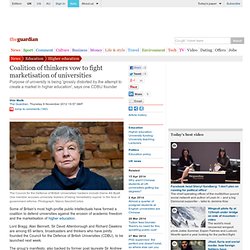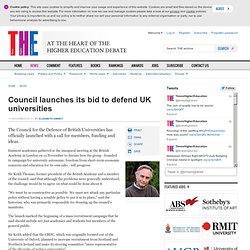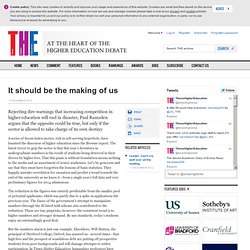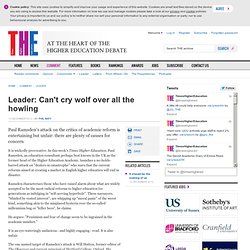

Record the Rot. Council for the Defence of British Universities. Founding Members. CDBU @cdbuni sur Twitter. Publisher profile for CDBU. The CDBU Weekly paper.li. Fidei defensores. Next week, scholars will launch the Council for the Defence of British Universities.

Historian Keith Thomas and astrophysicist Martin Rees, eminent founding members of the independent body, explain why they believe the academy requires protection from the state and the market Reversal of fortune Universities must return to teaching and researching what they believe is intrinsically worthwhile, not what is profitable, argues Keith Thomas Why should I, long retired from active academic life, have become involved with the Council for the Defence of British Universities? The answer is that like many members of my generation, I find much that is repugnant in the treatment of our universities by the present government and its recent predecessors. Over the past two to three decades we have seen ever-increasing government regulation of academic life. In the face of this onslaught, university leaders have, for the most part, been remarkably supine.
Coalition of thinkers vow to fight market isation of universities. The Council for the Defence of British Universities' backers include Dame AS Byatt.

One member accuses university leaders of being 'remarkably supine' in the face of government reforms. Photograph: Marco Secchi/Corbis Some of Britain's most high-profile public intellectuals have formed a coalition to defend universities against the erosion of academic freedom and the marketisation of higher education. Lord Bragg, Alan Bennett, Sir David Attenborough and Richard Dawkins are among 65 writers, broadcasters and thinkers who have jointly founded the Council for the Defence of British Universities (CDBU), to be launched next week. The group's manifesto, also backed by former poet laureate Sir Andrew Motion, Booker prize-winner Dame AS Byatt, playwright Michael Frayn and astronomer royal Lord Rees, claims the basis of a degree is under threat. Students, he wrote were "regarded as 'consumers' and encouraged to invest in the degree course they think most likely to enhance their earning prospects".
Nobel winners speak out for universities. THE: council launches its bid to defend UK universities. The Council for the Defence of British Universities has officially launched with a call for members, funding and ideas.

Eminent academics gathered at the inaugural meeting at the British Academy in London on 13 November to discuss how the group - founded to campaign for university autonomy, freedom from short-term economic concerns and education for its own sake - will progress. Sir Keith Thomas, former president of the British Academy and a member of the council, said that although the problems were generally understood, the challenge would be to agree on what could be done about it.
"We must be as constructive as possible. We must not attack any particular policy without having a sensible policy to put it in its place," said the historian, who was primarily responsible for drawing up the council's manifesto. In Britain, an Assault on Academic Values - WorldWise. Defending universities: engaging the public. CDBU’s Howard Hotson talks about NUS student protests and the future of British universities on Newsnight. “An Assault on Academic Values” writes Thomas Docherty in the Chronicle of Higher Education. It should be the making of us. Rejecting dire warnings that increasing competition in higher education will end in disaster, Paul Ramsden argues that the opposite could be true, but only if the sector is allowed to take charge of its own destiny A series of doom-laden stories, rich in self-serving hyperbole, have haunted the discourse of higher education since the Browne report.

The latest terror to grip the sector is that this year’s downturn in undergraduate numbers is the result of students being deterred in their droves by higher fees. That this panic is without foundation means nothing to the media and an assortment of senior academics. Let’s be generous and say that they must have forgotten the lessons of basic statistics. They happily mistake correlation for causation and predict a trend towards the end of the university as we know it - from a single year’s full data and very preliminary figures for 2014 admissions.
But the numbers alarm is just one example. Competition is natural to academics. Leader: Can't cry wolf over all the howling. Paul Ramsden's attack on the critics of academic reform is entertaining but unfair: there are plenty of causes for concern It is wickedly provocative.

In this week's Times Higher Education, Paul Ramsden, an education consultant perhaps best known in the UK as the former head of the Higher Education Academy, launches a no-holds-barred attack on "dealers in catastrophe" who warn that the current reforms aimed at creating a market in English higher education will end in disaster. Ramsden characterises those who have raised alarm about what are widely accepted to be the most radical reforms to higher education for generations as indulging in "self-serving hyperbole".
These naysayers, "blinded by vested interest", are whipping up "moral panic" of the worst kind, something akin to the misplaced hysteria over the so-called millennium bug or "killer bees", he claims. He argues: "Pessimism and fear of change seem to be ingrained in the academic mindset. " phil.baty@tsleducation.com.